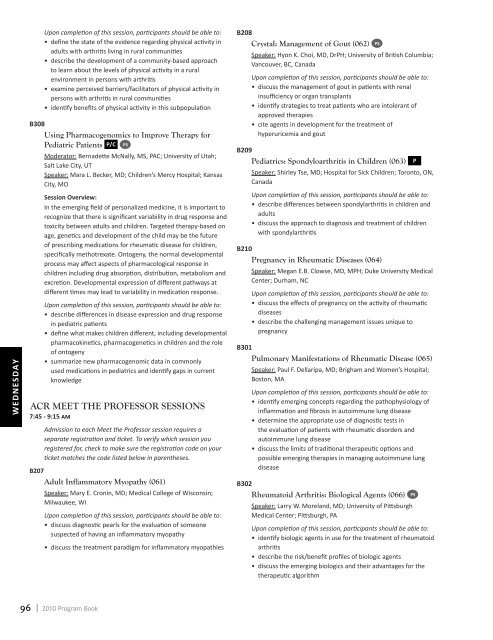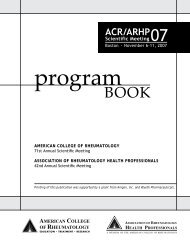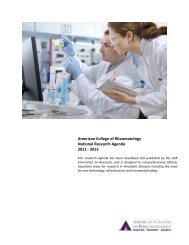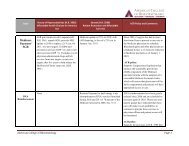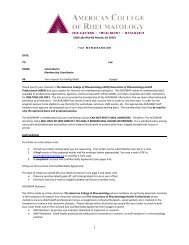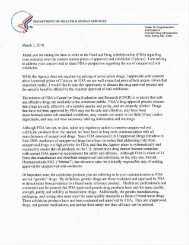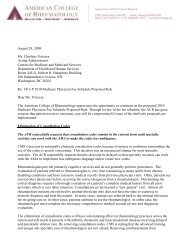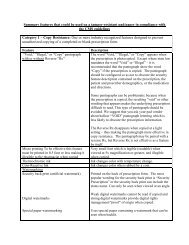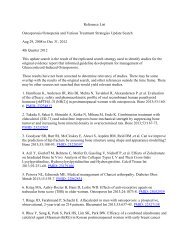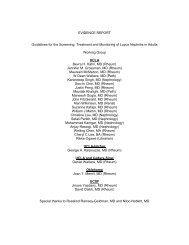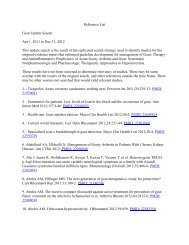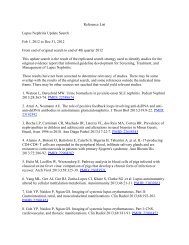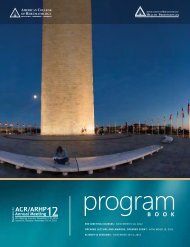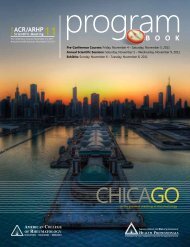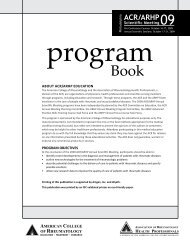B O O K - American College of Rheumatology
B O O K - American College of Rheumatology
B O O K - American College of Rheumatology
You also want an ePaper? Increase the reach of your titles
YUMPU automatically turns print PDFs into web optimized ePapers that Google loves.
wednesday<br />
Upon completion <strong>of</strong> this session, participants should be able to:<br />
• define the state <strong>of</strong> the evidence regarding physical activity in<br />
adults with arthritis living in rural communities<br />
• describe the development <strong>of</strong> a community-based approach<br />
to learn about the levels <strong>of</strong> physical activity in a rural<br />
environment in persons with arthritis<br />
• examine perceived barriers/facilitators <strong>of</strong> physical activity in<br />
persons with arthritis in rural communities<br />
• identify benefits <strong>of</strong> physical activity in this subpopulation<br />
B308<br />
Using Pharmacogenomics to Improve Therapy for<br />
Pediatric Patients P/C PS<br />
Moderator: Bernadette McNally, MS, PAC; University <strong>of</strong> Utah;<br />
Salt Lake City, UT<br />
Speaker: Mara L. Becker, MD; Children’s Mercy Hospital; Kansas<br />
City, MO<br />
Session Overview:<br />
In the emerging field <strong>of</strong> personalized medicine, it is important to<br />
recognize that there is significant variability in drug response and<br />
toxicity between adults and children. Targeted therapy-based on<br />
age, genetics and development <strong>of</strong> the child may be the future<br />
<strong>of</strong> prescribing medications for rheumatic disease for children,<br />
specifically methotrexate. Ontogeny, the normal developmental<br />
process may affect aspects <strong>of</strong> pharmacological response in<br />
children including drug absorption, distribution, metabolism and<br />
excretion. Developmental expression <strong>of</strong> different pathways at<br />
different times may lead to variability in medication response.<br />
Upon completion <strong>of</strong> this session, participants should be able to:<br />
• describe differences in disease expression and drug response<br />
in pediatric patients<br />
• define what makes children different, including developmental<br />
pharmacokinetics, pharmacogenetics in children and the role<br />
<strong>of</strong> ontogeny<br />
• summarize new pharmacogenomic data in commonly<br />
used medications in pediatrics and identify gaps in current<br />
knowledge<br />
ACR Meet the Pr<strong>of</strong>essor Sessions<br />
7:45 - 9:15 am<br />
Admission to each Meet the Pr<strong>of</strong>essor session requires a<br />
separate registration and ticket. To verify which session you<br />
registered for, check to make sure the registration code on your<br />
ticket matches the code listed below in parentheses.<br />
B207<br />
Adult Inflammatory Myopathy (061)<br />
Speaker: Mary E. Cronin, MD; Medical <strong>College</strong> <strong>of</strong> Wisconsin;<br />
Milwaukee, WI<br />
Upon completion <strong>of</strong> this session, participants should be able to:<br />
• discuss diagnostic pearls for the evaluation <strong>of</strong> someone<br />
suspected <strong>of</strong> having an inflammatory myopathy<br />
• discuss the treatment paradigm for inflammatory myopathies<br />
B208<br />
Crystal: Management <strong>of</strong> Gout (062) PS<br />
Speaker: Hyon K. Choi, MD, DrPH; University <strong>of</strong> British Columbia;<br />
Vancouver, BC, Canada<br />
Upon completion <strong>of</strong> this session, participants should be able to:<br />
• discuss the management <strong>of</strong> gout in patients with renal<br />
insufficiency or organ transplants<br />
• identify strategies to treat patients who are intolerant <strong>of</strong><br />
approved therapies<br />
• cite agents in development for the treatment <strong>of</strong><br />
hyperuricemia and gout<br />
B209<br />
Pediatrics: Spondyloarthritis in Children (063) P<br />
Speaker: Shirley Tse, MD; Hospital for Sick Children; Toronto, ON,<br />
Canada<br />
Upon completion <strong>of</strong> this session, participants should be able to:<br />
• describe differences between spondylarthritis in children and<br />
adults<br />
• discuss the approach to diagnosis and treatment <strong>of</strong> children<br />
with spondylarthritis<br />
B210<br />
Pregnancy in Rheumatic Diseases (064)<br />
Speaker: Megan E.B. Clowse, MD, MPH; Duke University Medical<br />
Center; Durham, NC<br />
Upon completion <strong>of</strong> this session, participants should be able to:<br />
• discuss the effects <strong>of</strong> pregnancy on the activity <strong>of</strong> rheumatic<br />
diseases<br />
• describe the challenging management issues unique to<br />
pregnancy<br />
B301<br />
Pulmonary Manifestations <strong>of</strong> Rheumatic Disease (065)<br />
Speaker: Paul F. Dellaripa, MD; Brigham and Women’s Hospital;<br />
Boston, MA<br />
Upon completion <strong>of</strong> this session, participants should be able to:<br />
• identify emerging concepts regarding the pathophysiology <strong>of</strong><br />
inflammation and fibrosis in autoimmune lung disease<br />
• determine the appropriate use <strong>of</strong> diagnostic tests in<br />
the evaluation <strong>of</strong> patients with rheumatic disorders and<br />
autoimmune lung disease<br />
• discuss the limits <strong>of</strong> traditional therapeutic options and<br />
possible emerging therapies in managing autoimmune lung<br />
disease<br />
B302<br />
Rheumatoid Arthritis: Biological Agents (066) PS<br />
Speaker: Larry W. Moreland, MD; University <strong>of</strong> Pittsburgh<br />
Medical Center; Pittsburgh, PA<br />
Upon completion <strong>of</strong> this session, participants should be able to:<br />
• identify biologic agents in use for the treatment <strong>of</strong> rheumatoid<br />
arthritis<br />
• describe the risk/benefit pr<strong>of</strong>iles <strong>of</strong> biologic agents<br />
• discuss the emerging biologics and their advantages for the<br />
therapeutic algorithm<br />
96<br />
2010 Program Book


